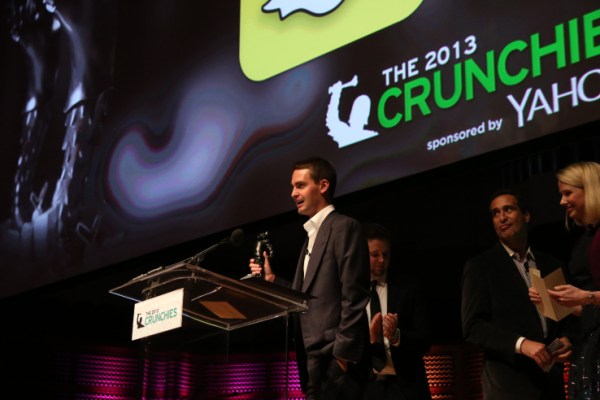With Facebook’s massive $19 billion purchase of WhatsApp earlier today, any possible marriage between Facebook and Snapchat appears to be dead.
After spending $20 billion on a photo sharing company (Instagram) and messaging company (WhatsApp), can Facebook really justify spending billions more to acquire an ephemeral photo messaging company?
CEO Mark Zuckerberg wanted Snapchat very badly; from blatantly cloning the app in December 2012 to making multiple acquisition offers, Zuckerberg saw an obvious fit between the ephemeral app and his social network giant.
WhatsApp co-founder and CEO, Jan Koum, will join Facebook’s Board of Directors as part of today’s acquisition deal. WhatsApp’s other co-founder, Brian Acton, spoke very harshly about Snapchat to Wired earlier today:
“It’s not 100 per cent clear to me what’s working about Snapchat,” he says. “Great, teenagers can use it to get laid all day long. I don’t care. I’m 42, essentially married with a kid. I don’t give a shit about this. I’m not sexting with random strangers. I send the ‘I love you’s in text. She’s sending me photos of our baby. These are memories. It’s not clear to me that being goofy with Snapchat necessarily creates that level of intimacy.
Clearly [Snapchat cofounder] Evan Spiegel only has his pulse on one part of the world. We have a whole wall of stories about people who got to know each other long distance and eventually got married. You’re not going to do this over Snapchat. And people want chat histories. They’re a permanent testimony of a relationship.”
At first glance, it seems like Acton doesn’t really understand Snapchat’s appeal or value proposition, which is very, very strange given that he has created one of the world’s most successful messaging companies. What’s far more likely is that Acton understands Snapchat perfectly well, and is throwing a few jabs at one of his main competitors.
But are these barbs just competitiveness, or does Acton actually think so little of Snapchat? And how will Acton’s and Koum’s feelings toward Snapchat affect a potential future acqusition now that Koum sits on Facebook’s Board?
Snapchat rejected Facebook’s over $3 billion acquisition offer in 2013. The hot startup has lured Emily White away from Instagram to become COO. Most importantly, it competes more than ever with Instagram and Facebook with its 24-hour ephemeral timeline, Snapchat Stories.
While the earliest versions of Snapchat competed primarily with messaging apps, the Stories feature has people posting and consuming photos and videos in a strikingly similar manner to Facebook and Instagram.
Zuckerberg tried once to directly clone Snapchat and failed. If he isn’t able to purchase Snapchat, or no longer wants to at the price, perhaps Facebook will try to develop its own take on ephemerality. Apps like Whisper and Secret have taken off by allowing users to post anonymously, just as Snapchat is making content ephemeral. People clearly want a different way to share content besides merely posting on Facebook and Instagram. Facebook needs to find a way to provide that to its users.
Meanwhile, Snapchat is now left with very few options if co-founders Evan Spiegel and Bobby Murphy choose to sell.
Google, which reportedly offered up to $4 billion for Snapchat, would still make a ton of sense for both companies. And Tencent, which sources say has already invested in Snapchat, would also be an interesting match.
That’s about it.
Snapchat doesn’t seem keen on selling any time soon (although neither did WhatsApp). The company would likely have to struggle with growth or monetization, or have repeated issues with security or lawsuits to seriously consider accepting an acquisition offer.
Based on its trajectory to this point, and its substantial pile of cash, it seems unlikely that Snapchat would sell until at least 2015. The company could continue its insane growth and eventually go public. It could falter, lose popularity, and flame out or sell for an unremarkable sum. But the third route, a top dollar acquisition to a major company, just became a lot less clear.

